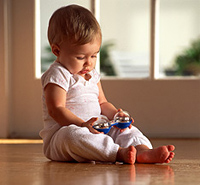Parents Should not Over-Protect Children from Germs
No one will argue that cleanliness in a living place is one of the main rules of hygiene.

Today a new study finds that children who grow up in super-clean, sanitized environments may be at higher risk for heart disease as adults.
Kids getting dirty on a playground is a time-honored tradition, but do you ever worry what kind of germs your child might pick up or put in their mouth?
A new study suggests you shouldn't necessarily be concerned.
“What we're finding has to do with the everyday pathogens you come in contact to, germs in the environment, germs that you might encounter in dirt and in your household that might actually have some beneficial effects long-term.”
Researcher Chris Kuzawa and his colleagues started following a group of Filipino children 26 years ago, and found that exposure to dirty environments early in life lowered production of c-reactive protein - a substance that is known to increase heart attack risk later in life.
“There is a need for the immune system to have some kind of challenge and to experience low-level pathogens within the environment. This is actually an important part of how the immune system develops.”
Encouraging findings, but Kuzawa says, “we're a long way from encouraging people to go out and pick up germs.”
“I think it would be very preliminary to ask parents to do anything differently with their kids based on what we found."
CNN News has contributed to the report.
Subscribe to Pravda.Ru Telegram channel, Facebook, RSS!


